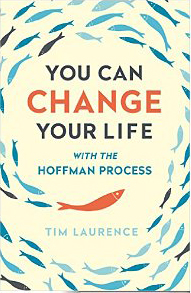The Hoffman Process: An introduction for healthcare professionals
The Hoffman Process is a life-changing, week-long residential course designed for deep personal growth and transformation. Developed and refined over 60 years, it has helped thousands of people break free from limiting patterns and step into a more fulfilling life.
Many therapists and coaches recommend the Process as a powerful complement to their work with clients.
How It works
Our thoughts, behaviours, and emotional patterns are shaped by early experiences. The Hoffman Process helps participants identify and release negative conditioning from childhood that may still be holding them back. Using a unique blend of proven techniques—including self-inquiry, guided visualization, journaling, and expressive exercises— participants will reconnect with their authentic self, rebuild confidence, and cultivate lasting self-esteem.
A safe and supportive space
The course takes place in a nurturing environment, guided by highly skilled facilitators who support at every step of the way. While the journey is deeply personal, the group setting adds an invaluable layer of connection, encouragement, and shared transformation.
Benefits and transformational results
The Hoffman Process creates lasting change, helping participants break free from unhelpful patterns and experience greater emotional freedom.
Many report a significant reduction in stress, anger, anxiety, and depression, along with a deeper capacity for joy, love, and connection.
What clients can gain from the Hoffman Process:
- Break free from negative patterns: Gain insight into self-defeating behaviours and belief systems that may be holding them back.
- Make conscious choices: Understand the root causes of their habits and learn how to align actions with true values.
- Heal emotional wounds: Identify and process feelings of anger, frustration, or grief in a supportive environment.
- Enhance emotional wellbeing: Experience a profound shift in overall mental and emotional health.
- Develop self-observation skills: Build awareness of thoughts and behaviours, leading to lasting positive change.
- Strengthen trust and connection: Cultivate a greater ability to trust self and others, opening to deeper relationships.
- Unlock creativity and purpose: Feel unstuck and inspired — function more creatively in work and personal life.
- Reconnect with true self: Deepen connection to our essence, including the spiritual part of being.
The Hoffman Process can also be incredibly beneficial for partners or family members of those in therapy, although they cannot attend the same course week together.
Recommending the Hoffman Process
We understand that recommending the Hoffman Process to a client is a significant step that requires careful consideration. Even when it aligns with long-term therapeutic goals, timing and readiness are key. To assist you, we’ve created a guide to help assess whether the Process is appropriate for your client and when it might be the right time.
How can the Hoffman Process support therapy or coaching?
Many therapists and coaches find that the Hoffman Process accelerates their clients’ progress. Participants often return from the Process with:
- Greater self-awareness and a deeper understanding of their emotional patterns
- Increased openness to exploring their inner conflicts and relationships
- Reduced defensiveness and resistance in therapy
- A heightened capacity for personal growth, confidence, and emotional resilience
Who is the Process best suited for?
The Hoffman Process is ideal for individuals who are:
- Functioning well but seeking rapid personal growth in an immersive environment
- Ready to explore the deeper roots of resistance to change
- Interested in understanding how childhood experiences shape current behaviors
- Looking to break recurring self-sabotaging patterns
- Seeking to deepen their emotional, relational, or spiritual awareness
- At an impasse in therapy, coaching, career, or relationships and in need of inspiration
The Process is most effective when the participant is personally motivated. It is not recommended for individuals attending solely because someone else believes they should.
Special considerations
Some individuals may require additional evaluation before enrolling. This doesn’t necessarily mean they can’t participate, but careful assessment is needed to ensure the Process will be beneficial.
Additional evaluation is required for clients with a history of:
- Suicidal ideation or attempts
- Psychosis or hallucinations
- Dissociative disorders
- Violent criminality
- Personality disorders
- Major depression
- Severe (C)PTSD
- Bipolar disorder
- Severe sleep disorders
- Active addiction
- Disordered eating
- Early sobriety/recovery
- OCD
- Functional neurologic disorders
We have seen many individuals with these histories benefit from the Hoffman Process, but success depends on thorough evaluation, realistic expectations, and strong support before and after participation.
Timing: When is the right moment to recommend the Process?
Life transitions often motivate people to seek change, but not everyone in crisis is ready for the intensity of the Process. It requires sustained emotional focus and energy. Consider whether your client has a stable support system in place for their return. If you’re unsure about their readiness, we are happy to consult with you to consider specifics around timing.
Medication guidelines
- Antipsychotics & Mood Stabilisers: We will assess with your client whether the Process is appropriate.
- Anticonvulsants: Must be taken as prescribed throughout the Process.
- Antidepressants: Should be continued as prescribed.
- Anxiolytics & Hypnotics: We will discuss with your client how these may impact their experience and whether the Process is appropriate.
How to recommend the Hoffman Process
Our team is available to guide your client through the decision-making process. You can:
- Share our materials with your client and encourage them to contact us when ready
- Invite them to attend an Introduction to Hoffman webinar
- Suggest they explore our website or read You Can Change Your Life by Tim Laurence
We believe in personal readiness and do not pressure individuals to enrol. When your client feels it’s the right time, we’ll be happy to discuss the Process with them.
Hoffman participation: What happens after enrolment?
Once your client has enrolled in the Hoffman Process, our team is available via phone and email to answer any questions or concerns that may arise before they begin their journey.
Pre-Process preparation
Before attending, your client will complete a set of pre-course exercises designed to deepen their self-reflection and readiness for the Process. Depending on your work together, it may be helpful to discuss this preparation with them. Exploring how their presenting issues relate to Hoffman’s Negative Love Syndrome (watch a video on YouTube [here]) can be a supportive step in their process.
However, we generally advise against directly assisting your client in filling out their pre-course work. This step serves as an important indicator of their readiness and ensures they are taking ownership of their personal journey.
The Process week
A core intention of the Hoffman Process is to help participants develop greater self-confidence by breaking free from negative patterns learned in childhood. As they reconnect with their authentic self, they often experience:
- Increased trust in their own inner wisdom
- Greater personal responsibility and effectiveness
- Reduced dependency on others and less self-blame
Post-Process: Integration and transition
To fully absorb and integrate their experience, we recommend that participants take the weekend following the Process as a retreat—away from home life, work, and social obligations. Many find this to be a valuable time for reflection, helping them process their insights and transition smoothly back into daily life.
Post-Process follow-Up & continuing therapy / coaching
Many participants return from the Hoffman Process with a renewed sense of clarity, confidence, and self-awareness. If you are a therapist or coach—and especially if you are a Hoffman graduate yourself—your client may be eager to bring their newfound insights into their ongoing sessions with you.
Often, pre-Process goals have been met, and post-Process support becomes an opportunity to set new goals, focusing on how to integrate lasting personal change into daily life and relationships. The Hoffman Process is designed to complement therapy and coaching, not replace it. Your role remains the primary healing relationship for your client, and we encourage them to continue working with you after their Process experience.
Additionally, many clients develop a stronger commitment to personal healing and may see their therapist or coach as an essential part of their support network—often leading to referrals from their friends, family members, and fellow Hoffman graduates. This can organically expand your practice and deepen your involvement in a wider healing community.
Bringing the Hoffman model into your own practice
Your personal therapeutic or coaching style is what your client is familiar with, and there’s no need to change that. However, their experience with the Hoffman Process may introduce new insights and tools that can enhance your existing work together.
Guiding Post-Process reflections
In the sessions immediately following the Process, most clients simply want to share their experience and feel heard. You might consider asking reflective questions to help them integrate their learning into therapy:
- What were the most distressing negative traits you inherited from your parents?
- How have these patterns shaped your relationships, career, or sense of self?
- What insights did you gain from the cathartic exercises?
- How do you experience yourself differently now?
- How do you feel about your parents and your past since completing the Process?
- What new vision do you have for your life moving forward?
- How are you using the Hoffman tools in your daily routine?
By exploring these questions, you can help your client process their experience while reinforcing their ability to apply what they’ve learned in a meaningful way.
Common Post-Process challenges
While the Hoffman Process provides powerful breakthroughs, integrating those changes into everyday life isn’t always seamless. Some clients may experience challenges such as:
- A sense of emotional comedown after an intense peak experience
- Unresolved grief surfacing from childhood wounds
- Abandonment depression or resistance to fully stepping into change
- Loss of old friendships that no longer feel aligned
- Facing unchanged external circumstances (e.g., ongoing relationship struggles, work stress, financial difficulties)
- Overanalysing others based on their new insights, rather than focusing on their own growth
- Family or partner resistance to their personal transformation
We recommend encouraging clients to avoid making major life decisions (e.g., leaving a job, ending a relationship, or moving) within the first 2-3 months post-Process. This allows them to fully experience the impact of their inner transformation before making external changes.
Post-Process support & community
To help graduates maintain momentum, the Hoffman Institute offers a range of post-Process support options:
- Support Groups: Facilitated groups for graduates to reinforce their learning and share their experiences.
- Follow-Up Sessions: One-hour coaching sessions with Hoffman facilitators via phone or Zoom, designed to help graduates gain deeper awareness and apply Process tools to specific life challenges.
- Graduate Q2 retreat: A three-day residential programme, held several times a year, allowing graduates to revisit key insights and focus on specific areas of growth.
- Reconnection Days: One-day workshops led by Hoffman facilitators in-person and online, offering graduates a chance to re-engage with their Process tools.
- Graduate Zoom Community: Free twice-weekly guided Zoom calls (8:00 AM UK time) and monthly webinars with Hoffman facilitators to deepen practice and community connection
- Post-Process website: Graduates have access to a dedicated section of our website featuring guided visualisations, self-compassion exercises, and other supportive tools.
Questions?
If you have any questions or feeedback, please email info@hoffmaninstitute.co.uk. If your email contains feedback, we will ensure it reaches the Hoffman Institute Directors.





 Sign up to receive monthly newsletters from Hoffman
Sign up to receive monthly newsletters from Hoffman